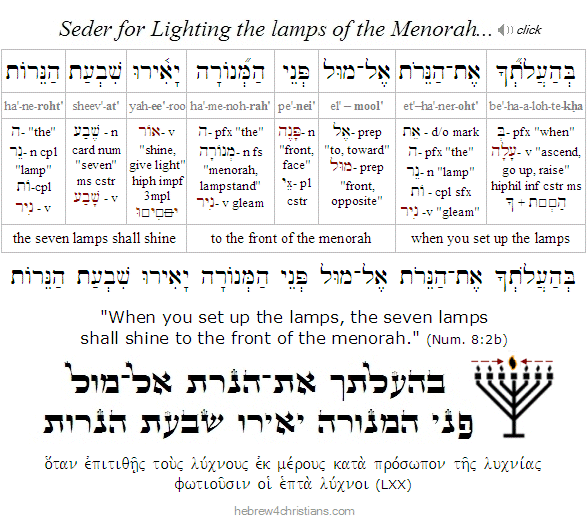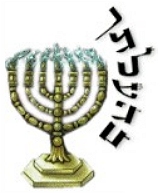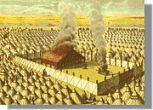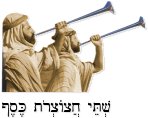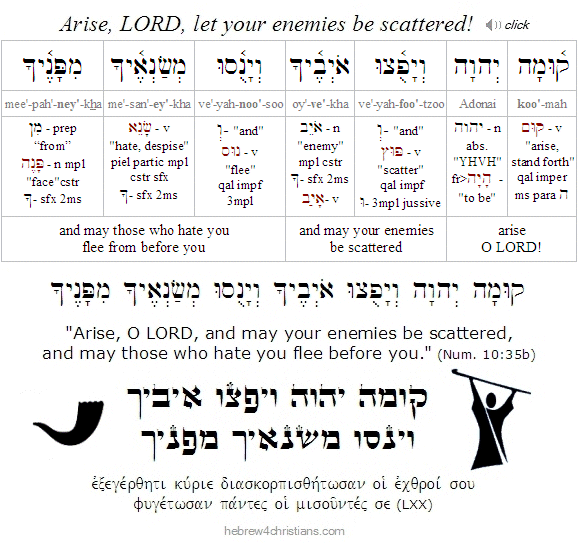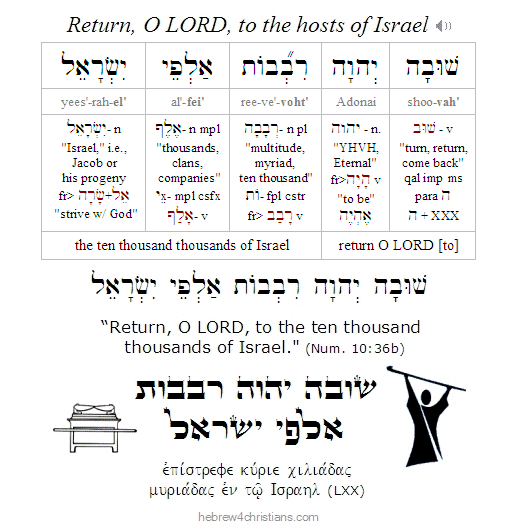|
|
 |
 |
 |
 |
|
Weekly Torah Reading
|
|
|
|
Parashat Beha'alotekha ("When you set up")
|
|
|
Click on the links to display the Scriptures:
|
|
|
|
 |
 |
|
Torah Reading Overview
|
|
|
Last week's parashah (Naso) concluded with the Israelite camp arranged around the completed Mishkan (Tabernacle), furnished and supplied by donations from each of the 12 tribes. Moses was inside the Mishkan, listening to the Voice of the LORD "speaking to him from above the mercy seat that was on the ark of the testimony, from between the two cherubim."
In this week's parashah, the LORD first gives instructions about how to light the seven lamps of the menorah within the sanctuary (inner chamber) of the Mishkan. It begins:
|
|
|
 |
 |
|
The LORD spoke to Moses, saying: Speak to Aaron and say to him, "When you set up the lamps, the seven lamps shall shine to the front of the menorah." (Numbers 8:1-2)
|
 |
 |
|
The menorah was the place of holy fire and light within the Mishkan. This holy lampstand was elaborately fashioned out of a single solid piece of gold. Each of the menorah's seven branches was intricately engraved with decorative knobs, cups, and flower-like figures, and pure olive oil was used to illuminate its flames. According to midrash, God Himself made the menorah, based on exegesis of Numbers 8:4b: "according to the pattern that the LORD had shown Moses, so He (i.e., the LORD) made the lampstand." The wicks of the menorah were bent toward the middle as if to accentuate the shamash (central) wick.
|
 |
 |
 |
 |
|
The Dedication of the Levites
|
|
|
|
Moses then gathered the Levites together in order to purify them for their avodah (service) at the Mishkan. This is how the Levites were purified:
|
|
|
|
- They were sprinkled with water mixed with the ashes of the red heifer and then immersed in a mikveh (a ritual bath containing flowing water). This was to purify them from tumat hameit - impurity from contact with the dead.
- The hair on their bodies was completely shaved off (i.e., to take the place of the metzora who was purified from tzara'at).
- The Israelites were called to the Mishkan and the firstborn among them performed semikhah by laying their hands on the heads of the Levites (transferring the role of the firstborn (bechor) to the Levites).
- Aaron (the Kohen Gadol) then lifted each Levite up as tenufah lifnei Adonai - a wave offering before the LORD. Each Levite was literally picked up off the ground and waved up, down, left, right, etc., by the High Priest (with 22,000 Levites, this must have been some undertaking for Aaron!).
- The Levites then laid their hands on selected bulls and Moses offered korbanot: a chatat (sin) offering and an olah (ascending) offering.
|
|
|
Pesach Sheini
|
|
 |
 |
|
Recall that the Book of Numbers begins with the statement that the LORD spoke to Moses "on the first day of the second month in the second year after they had come out of the land of Egypt," but the events beginning in Numbers 9:1 are said to occur "in the first month of the second year" (cp. Num. 1:1-2; 9:1-5), which indicates that the book is not written in chronological order.
As you know, on the day before the Exodus from Egypt, every Israelite offered a lamb as korban Pesach - a Passover sacrifice - to God. Now, a year later, the LORD instituted Passover as one of the yearly mo'edim by saying: "The children of Israel shall keep the Passover at its appointed season. On the fourteenth day of this month (i.e., Nisan 14), at twilight, you shall keep it at its appointed time; according to all its statutes and all its rules you shall keep it" (Num. 9:2-3).
Before the Israelites celebrated the Passover, however, a group of men who were responsible for carrying Joseph's coffin (and were therefore tamei (unclean) because of their contact with the dead) asked Moses how they could partake of the ceremony, since under the laws of Passover, they were unfit for the Seder.
Moses inquired of the LORD, who then instituted Pesach Sheini ("Second Passover"). This second day would be exactly a month later (on Iyyar 14) when all those who missed the first Passover would be required to eat the korban Pesach (Passover lamb) with bitter herbs and unleavened bread in memory of the Exodus from Egypt. Unlike the regular Passover, however, unleavened bread was not required to be eaten the week following Pesach Sheni. (Today, some mark Iyyar 14 by eating matzah in a way analogous to eating the Afikoman-Matzah at the Passover Seder.)
Note, however, that even though the LORD permitted Pesach Sheini for those who were unable to partake of the Nisan Passover celebration, if anyone who is not unclean or otherwise unable to partake of the Seder fails to keep the Nissan Passover, that person would be "cut off" from his people (meaning subject to divine judgment and early death).
|
 |
 |
 |
|
The Cloud over the Mishkan Leads Israel
|
|
|
|
The portion then repeats the events that ended the Book of Exodus, describing how the Shekhinah cloud covered the tent of meeting, and that whenever the cloud lifted, the people of Israel would set out, and wherever it settled, the people would camp. The Israelites traveled this way for 40 years in the desert, never knowing when a journey would begin or how long it would last (Num. 9:15, cp. Pekudei).
|
|
|
The Two Silver Trumpets
|
|
|
|
|
 |
 |
|
The LORD then instructed Moses to make two silver trumpets (shtei hatzotzerot kesef) to be used to summon the camp to attention. The kohanim (priests) used different sounds to signal events. A tekiah (te-KEE-yah) is a straight, unbroken blast, whereas a teruah (te-ROO-ah) is a staccato division of the tekiah into nine rapid-fire notes (alarm).
|
|
 |
 |
|
When both trumpets were blown tekiah, all of Israel were to meet Moses at the entrance of the Mishkan for instructions; if only one trumpet was sounded, then just the nesi'im (leaders) were to convene. When Israel was to decamp and move to another location in the wilderness, both trumpets would blast tekiah-teruah-tekiah.
|
 |
|
|
|
Signaled Event
|
Trumpet Sound
|
|
Gathering of all Israel
|
Tekiah (both trumpets)
|
|
Gathering of the leaders
|
Tekiah (one trumpet)
|
|
Departure from the camp
|
Tekiah - Teruah - Tekiah (both trumpets)
|
|
 |
 |
|
The teruah was an alarm used to signal camp movements. Whenever the LORD moved the entire camp, Judah (the east most camp) would break first. When the second teruah was sounded, the camp of Reuben (the south most camp) would break. And so on.
In cases of battle, the sound of the trumpets would be used "so that you may be remembered before the LORD your God, and you shall be saved from your enemies" (10:9). They would also be used during appointed feasts and celebrations (10:10).
|
 |
 |
 |
 |
 |
 |
 |
 |
|
Israel Leaves Sinai
|
|
|
|
After this, the Torah records that the Israelites broke camp on Iyyar 20 of their second year in the wilderness, journeying in formation from Mount Sinai, where they had been camped for nearly a year. It was at Sinai that Moses had first set up the Mishkan, dedicated the priesthood, and taught the people the mitzvot of the Torah. In the "second year, in the second month, on the 20th day of the month" (i.e., Iyyar 20), the cloud lifted from over the tabernacle and the people set out "by stages" toward the desert of Paran in the Negev (the place where Hagar and Ishmael were once abandoned).
First the eastern camp led by Judah set out, followed by the Levites who moved the Tabernacle. Then the southern camp of Reuben set out, followed by the Kohathites who carried the Tabernacle's sacred furnishings (e.g., the Menorah, the Table, etc.). Then the western camp of Ephraim set out, followed by the northern camp of Dan which served as a "rear guard" for all the other camps. It is unclear whether the Ark of the Covenant was dispatched ahead to lead the camps into the desert (Num.10:33-36).
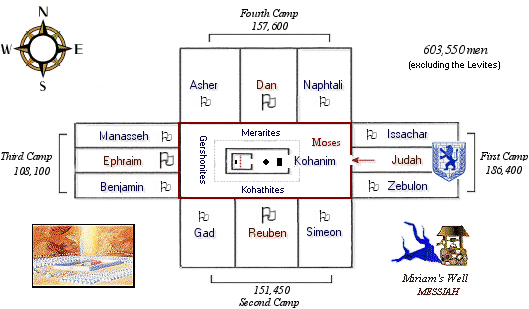 |
Whenever the Israelites broke camp, the Cloud over the mishkan would ascend as a column and rest over the tribe of Judah. The silver trumpets would then sound for the departure of the camp and everyone would begin mobilizing. When the Kohathites were ready to move the ark and sacred objects, Moses would then say the words:
When the trip was finished, the Cloud stopped moving and the camps would be set up, including the Mishkan and all its furnishings. The Cloud would not descend upon the Mishkan, however, until Moses prayed the following:
(Today these same pesukim (verses) are recited when the Sefer Torah (Torah Scroll) is taken out of the ark in the synagogue during the Torah processional at services.
|
|
|
|
Jethro Leaves Israel?
|
|
|
|
When Israel broke camp to finish its trek to the Promised Land, Yitro (Jethro), Moses' father-in-law, said he would return to Midian. Moses appealed for him to stay with them and share in God's blessing of Israel. It is unclear, however, whether Yitro stayed with the Israelites (as a ger tzeddek) or if he actually went back to Midian. One midrash says that he chose to stay with Israel and his descendants became members of the Sanhedrin (the zekanim who judged Israel). Ibn Ezra puts forward the suggestion that "Chovav" is Moses' brother-in-law (that is, the brother of Tzipporah, Moses' wife), and that Re'uel is another name for Yitro. Jewish commentaries on this subject provide varying interpretations.
|
|
|
Taberah: The "People" Complain
|
|
|
|
After three days journey from Sinai to the Promised Land, the people began to murmur and complain of their difficulties, and the LORD sent a fire from heaven that consumed "the edge of the camp." Some Jewish commentators say that those who complained were the eirev rav - the "mixed multitude" (Exod. 12: 38) that joined with Israel at the Exodus, since these would be the ones dwelling at the outskirts of the camp and not part of the formation of the shevatim (tribes) of the greater machaneh (camp) of Israel. However, many of the Jews were also killed, including the 70 zekanim (elders) who ate the covenant ratification meal on Sinai, and Moses interceded on behalf of Israel. The name of the place was called tav'eirah ("Taberah"), perhaps as a wordplay on eirev rav.
Some time after this the "rabble" began to lust after meat. The word translated "rabble" is the word ha'safsuf (הָאסַפְסֻף) which means a gathered mass of people, perhaps survivors of those who had been killed by the fire from the LORD. But the Israelites also fell to complaining along the same lines ("Who will give us flesh to eat?"), which is a bit strange since they had herds of animals that could be slaughtered for food. The Torah states that the Jews missed their "free fish" along with the cucumbers, melons, leeks, onions, and garlic" and now were fed up with eating the manna that God graciously supplied. Perhaps the Israelites were unwilling to slaughter their livestock because they intended to use them in the Promised Land, or perhaps they were afraid that they were only to be eaten before the LORD during sacrificial occasions... At any rate, Jewish midrash states that the manna was a supernatural food that changed its taste according to the faith and gratitude of the one who ate it. For the tzaddikim (righteous ones), manna tasted wonderful, but to the reshaim (wicked and faithless ones), it tasted dry and boring.
When Moses heard the people weeping, he was displeased, and the anger of the LORD blazed. Moses then complained to the LORD that he was all alone and asked Him how he could provide meat for the people. God told him to find 70 new zekanim (the previous 70 were killed at Tav'eirah) and convene them at the Mishkan to receive a portion of the ruach nevu'ah (prophetic spirit) so that Moses would not have to bear the burdens of the people by himself. He then told Moses to tell the people that the next day God would provide them with meat -- in fact, so much meat that it would "come out of their nostrils" and become loathsome to them.
Midrash states that Moses wanted to choose six men from each tribe to be part of the new leadership of Israel, but that would make 72 elders, rather than 70. He used a lottery system to exclude two of the zekanim, and the two left out were Eldad and Maidad. The LORD honored these two men, however, and put the spirit of prophecy upon them. When Joshua was told, he asked Moses to stop them, but Moses was grateful and exclaimed that he wished all the LORD's people were prophets!
The LORD then sent a mighty wind that caused swarms of quail to be strewn all over the camp. The people eagerly gathered them up and collected as much as they could. However, while "the meat was yet between their teeth" the infectious quail became a plague -- and many Israelites died. The place was named kivrot-hata'avah ("the graves of those who craved") in memory of those who were killed.
|
|
|
|
Mirian and Aaron's Lashon Hara
|
|
|
|
According to Jewish tradition, after the revelation of the Torah to Israel at Sinai, Moses separated from his wife Tzipporah because of his service to the LORD. But Moses' sister Miriam thought he was sinning, and spoke to Aaron about the matter. Miriam not only questioned Moses' decision to leave his wife, but also questioned his unique role as the mediator of the covenant at Sinai. The Hebrew text reads, "They said, 'Has the LORD only spoken by Moses? Has he not also spoken by us?' And the LORD heard it." Interestingly, even though it was Miriam who said these words, the plural pronoun "they" is used, implying Aaron's consent in this lashon hara (evil speech).
The LORD then called Moses, Aaron, and Miriam to the Mishkan. The Pillar of Cloud then descended before them and called Aaron and Miriam to come forward. God then told them that others in Israel may have occasional visions or dreams about the LORD, but only with Moses does God speak directly (peh-'al-peh - "mouth to mouth"), without riddles, and only Moses can behold the likeness (temunah) of the LORD Himself. God then asked them why they were so brazen to criticize the one whom the LORD has chosen. When the Pillar of Cloud ascended, Miriam was left with tzara'at, the punishment for lashon hara.
Since the metzora was made an outcast of Israel, Aaron pleaded with Moses for forgiveness and mercy, and Moses prayed on their behalf. Despite his intercession, however, the LORD banished her from the camps of Israel for seven days. The LORD's mercy is shown here, since the Pillar of Cloud waited until Miriam returned to the camp before Israel continued their trek to the Promised Land.
|
|
|
|
 |
|
|
|
Haftarah Reading Overview
|
|
 |
 |
|
The prophet Zechariah (זְכַרְיָה) delivered his prophetic message to Yehoshua ben Yehotzadak, the Kohen Gadol, and to Zerubavel, the Jewish Governor (who was appointed by the Persians) during the return to Jerusalem to rebuild the Temple. Yehoshua (Joshua) seemed to be on trial in a Heavenly courtroom with Satan accusing him. In defense of Yehoshua, the LORD said, "Hear now, Yehoshua, High Priest, behold I am bringing my servant, Tzemach" (Zech. 3:8). Tzemach (צֶמַח, Branch) is a metaphorical name for the Mashiach, the offshoot of King David (Jer. 33:15). Of him the prophet says, "Behold, a man called the Branch (tzemach) shall branch out (יִצְמָח) from the earth, and he shall build the Temple of the LORD (בָּנָה אֶת־הֵיכַל יְהוָה)" [Zech. 6:12]. Zechariah regards the high priest Yehoshua (the same name as "Jesus/Yeshua") as a picture or foreshadowing of God's future fulfillment in Yeshua, the coming greater High Priest after the order of Malki-Tzedek. Yeshua is the One who will ultimately restore the Temple of the God of Israel in the truth.
The haftarah concludes with a connection with the menorah in the parashah. Like Moses who foresaw the menorah in the Mishkan (Tabernacle), Zechariah is shown a vision of a Menorah. Two olive trees stand next to the Menorah, one on the right, and one on the left (Zech. 4:2-3). The two olive trees may picture the priesthood and the kingship united in the Person of the Mashiach, Yeshua, or they may refer to Israel and the Church, respectively. Note that the portion ends with, "he shall bring forth the top stone (הָאֶבֶן הָראשָׁה) with shoutings of 'Grace, grace, unto it' (Zech. 4:7).
|
 |
 |
|
The Hebrew word beha'alotekha comes from the root alah (עלה) meaning to ascend or "go up," though in the causative stem (such as the hiphil, as in this case), it can also mean to "offer." The olah offering (same root) is a whole burnt offering in which the sacrificial animal is turned to smoke that ascends heavenward.
Midrash states that Aharon (Aaron) was completely humble in his office as the first Kohen Gadol (High Priest) of Israel. It is said that his task to light the lamps of the menorah was never routine for him, but he remained reverent every time he performed this avodah.
This seemingly modest act of faithful service again indicates that what man esteems and what God esteems are very often two entirely different things. After all, the light of the menorah was not visible to those of the camp of Israel since it shined within the confines of sacred chamber of the Mishkan (Tabernacle). Only the priests who served could behold this light; otherwise it remained hidden from the eyes of man...
There is a "transposition" of values, a "holy irony," in the realm of the Spirit. From God's perspective that which considered great in the eyes of men is considered of little account, and that which is considered insignificant in the eyes of men is considered of great importance (Luke 9:48). The wisdom of this world (i.e., the pragmatic, the self-promoting egotism, etc.) is folly before God (1 Cor. 1:20, 3:19). Even the Mashiach Yeshua emptied Himself and was disguised as a lowly servant (εαυτον εκενωσεν μορφην δουλου). Unlike those various systems of religion that attach merit and status to those who have attained respectable levels of personal sanctity, those who are called great in the Kingdom of Heaven (מלכוּת השׁמים) will be recognized as the servants of all (Mark 9:35; 10:44).
Blessing:
|
|
|
 |
 |
|
Hebrew Audio Files:
|
|
 |
 |
|
Click the following links to hear the desired chapters read from this week's Torah:
|
|



